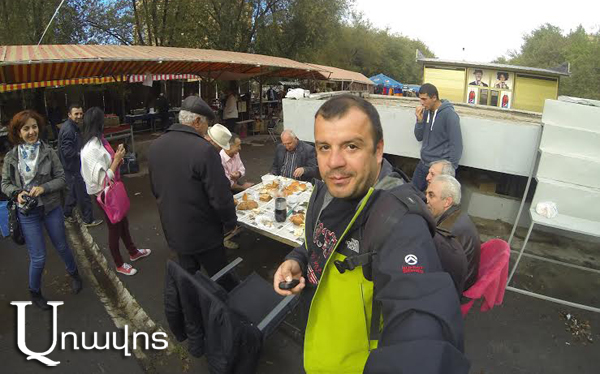Says Turkish photo-journalist Aykut Güngör
“Earlier, when we were hearing bad news from Armenia, like, there is a war, a conflict, we could be sad and sorry. But now, if we hear something like that, with all due respect to Turkey, Azerbaijan and Russia, we would be worried about you: Hripsime, Anna, Mary and Sona. I would worry about what would happen to you,” says Turkish photojournalist Aykut Güngör in the conversation with “Aravot”. We have met with him and had a two-week tour in October in financial support of the “Eurasia” Partnership Foundation and the European Union during the bus-tour organized for the Armenian and Turkish journalists and bloggers. The contact with Aykut was in few words and mostly with gestures, our communication language was English, which he was not fluent, but it was enough to know him.
Our very attentive and with delicacy Turkish partner differed with his position regarding the normalization of Armenian-Turkish relations, and it was so sudden and unexpected for us that it did even generate doubt, possible he has Armenian roots. Aykut immediately dispelled our doubts, he grew up is a family that had denial attitude towards the Armenian issue, when he has raised such a question in his family, maybe they are also Armenians, his father immediately has answered, “Do not mix us in your affairs.”
Prior to being engaged in photography, Aykut Güngör was interested in motorsport, has not achieved higher education, he had no chance. Since mid-1990s, he has worked at professional photographers as an assistant, he was doing landscapes. “Then I started working as a photojournalist in Bursa local newspaper, tells Aykute and note that since then his career as a photographer began, in 1997, I took photographs during “Nowruz”(a Kurdish holiday), it was a unique Kurdish festival, which was accompanied by demonstrations. I photographed this event taking place in Bursa. In one of the photos, the police and demonstrators were waiting for each other. The police were waiting to intervene, even in the case when there was no need for interference… My friend advised me to submit with this photograph a request application to participate in “Associated Press” event, which was entitled “100 photographs of the century.” And I was one of the five Turkish photographers who was lucky enough to take part in this event.”
Being in fond of his profession, Aykut Güngör does not consider it a priority in his life. “When the earthquake hit Turkey in 1999, I went to the disaster zone without taking my camera, I was as a rescuer there. Being human is more important to me than being a photographer. I could photograph the best photos from the place of the earthquake, but I was not one of those who first photographs and then helps. I must first help, then maybe photograph, but I have no photos of these days,” he smiles. Already in Armenia, in the conversation with us, he becomes sincere saying that he wanted to take part in the bus tours organized for Armenian and Turkish journalists and bloggers because they he wanted to see Armenia in his own eyes. “We were brothers and sisters during the entire tour. It had an emotional impact on my thoughts during the whole trip.”
As to what extent the mutual contact between the two countries’ citizens will influence, to what extent the culture will promote, Aykut Güngör is skeptical about the photography in normalization of the Armenian-Turkish relations. “Of course, the culture has an effect on normalization of relations between the two countries, but its impact is limited… Personal interactions would not play a role in political decisions.”
Being in Armenia, the Turkish photographer wanted to see and record the neighboring county’s life, how people live here. “I am doing Vernissage photos, in one place people were having breakfast. I approached them and started taking photos. I do not speak English well, I know only some 10-15 word, they did not know much English too, but they tried to communicate with me, we were communicating with each other in mimics and with the ten words I know. I told them that I’m from Istanbul, thus, they would understand me easier, they perhaps would not know where Bursa is. And when I said that I am from Istanbul, one of the old-age men asked whether I am an Armenian or Turkish, when I said that I am a Turkish, he hit my shoulder and said, aghbarik. They invited me to share the bread, basturma and vodka with them, – tells Aykut Güngör, adding, “I’m going to show this to the Turkish people to know what kind of people are in Armenia. Although, there were some among them who did not treat me so good, it appeared from the expression of their face.”
Speaking logically about the most discussed topic during the trip, the recognition of the Armenian Genocide, Aykut Güngör says, “It’s hard to cover up the obvious. There is a huge problem and pain, which you can read on people’s face. First, you must admit it, then do something to heal the wounds and feelings of people, without causing harm to the people of the two countries, because there will be some effects and counter effects in Turkey. It is easy to admit the Genocide. You can say, yes, I admit it, but what are you going to do after the words… you should add something, you must improve the relations between the two countries. The outcome is important. Saying I am sorry is easy, I can look at your eyes and say, “I’m sorry”, says he and adds, “something should be done to reimburse, everyone should understand what they deserve. We should not owe to you. This is an utopian desire, but it is my desire.”
HRIPSIME HOVHANNISYAN






















































